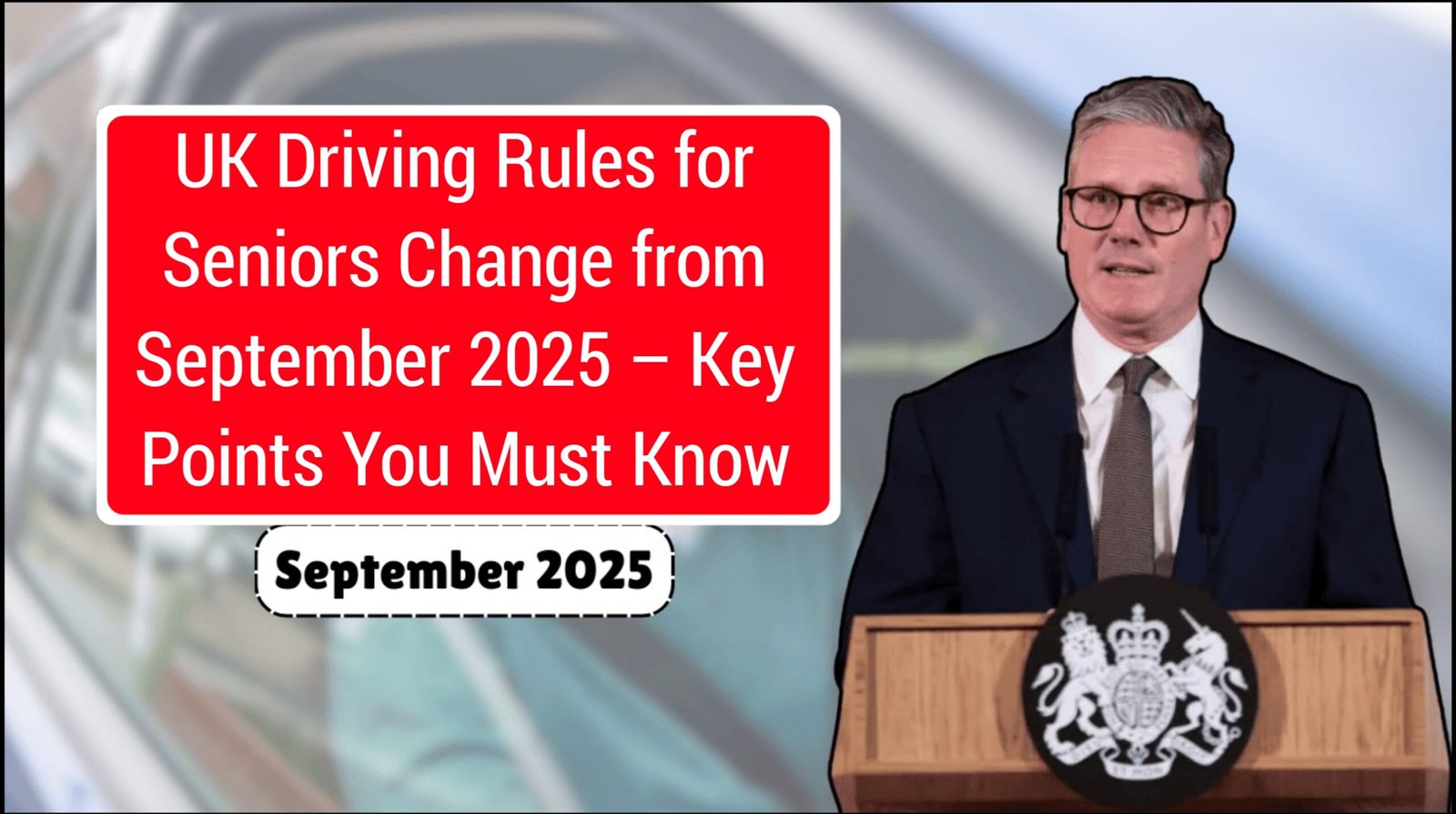The UK government has announced a series of updates to driving rules that directly affect older drivers from September 2025. These changes are designed to improve road safety, simplify renewal processes, and ensure that senior motorists receive the right support to keep driving safely. This article explains the most important points you need to know, how they might impact your licence, and what you can do to prepare.
Renewal age and frequency
Under the new regulations, drivers aged 70 and over will still be required to renew their licences but the frequency of renewal will change. Instead of every three years, certain medical or vision checks may trigger a shorter renewal period. This aims to create a more personalised approach, allowing seniors who meet health standards to retain their licence for longer while identifying those who may need more frequent reviews.
Medical self-declaration
From September 2025, the DVLA will introduce a new online self-declaration system. Senior drivers will need to answer a series of health-related questions covering eyesight, mobility, and long-term conditions. The form is designed to be simple and quick, replacing some of the paper-based forms currently used. Honest disclosure will be essential, because supplying false information could lead to fines or disqualification.
Vision testing standards
The updated rules place greater emphasis on vision. While the basic requirement of reading a number plate at 20 metres remains, the DVLA will encourage regular eye tests for drivers over 70. Some high-risk categories may be asked to submit proof of an optician’s report when renewing. This shift reflects evidence that clear vision is crucial for reaction times and safe driving.
Fitness to drive assessments
A key part of the September 2025 update is a more consistent system for assessing fitness to drive. If the DVLA receives information from a GP or specialist about a condition that could impair driving—such as dementia, epilepsy, or severe arthritis—an assessment may be required. These assessments will be offered free or at a reduced cost to pensioners. The goal is to keep people mobile for as long as it’s safe, not to remove licences unnecessarily.
Digital reminders and support
The new rules will also roll out digital reminders. Pensioners can opt in to receive text or email alerts when their licence or medical information needs updating. This will help seniors avoid accidental lapses in licensing, which can invalidate insurance. For those who are not comfortable online, telephone and postal options will remain.
Impact on car insurance
Insurance companies in the UK base premiums on risk. The September 2025 changes may affect how insurers view older drivers, especially those who have passed new vision or fitness checks. Drivers who comply promptly may be offered lower premiums, while those who delay might see higher costs. Keeping documentation up to date will be crucial when renewing your policy.
New training opportunities
Recognising that many seniors have decades of experience but may not be familiar with new traffic technology, the government is partnering with charities to offer voluntary refresher courses. These short sessions cover updated Highway Code rules, electric vehicle etiquette, and advanced driver-assistance systems (ADAS). Although not mandatory, completing such a course could demonstrate competence and support insurance discounts.
Electric vehicles and seniors
With the UK moving towards electric cars, the rules also emphasise safe charging and parking for older drivers. New signage will appear at public charging stations from September 2025 to make instructions clearer. Seniors unfamiliar with EV connectors or payment apps will be able to request assistance through a dedicated helpline.
Stricter penalties for non-compliance
Failure to follow the updated requirements can result in penalties. Driving with an expired licence or without submitting required health information could lead to fines of up to £1 000 and potential prosecution. The government stresses that these measures are not about punishing older drivers but ensuring everyone on the road meets a safe standard.
Preparing now
Although September 2025 may feel far away, it’s wise for pensioners to start preparing. Book a routine eye test, review your medications with your GP, and sign up for DVLA online services if you’re comfortable using a smartphone or computer. Keeping a folder with your driving documents, insurance, and health notes will make renewal smoother.
Community transport alternatives
The update also highlights community transport schemes. For seniors who decide to give up driving voluntarily, councils will expand access to dial-a-ride and discounted bus passes. This ensures that giving up a licence does not mean losing independence.
Common myths about older drivers
There are several myths surrounding senior motorists. Some people believe that once you reach 70, you automatically lose your licence, which is false. Others think all older drivers are unsafe, which statistics do not support. The September 2025 changes aim to move away from blanket assumptions and focus on individual ability.
Benefits of the new rules
While any change to driving regulations can feel inconvenient, these updates carry clear benefits. They increase road safety, give seniors more personalised renewal options, offer support for medical and vision needs, and introduce technology to reduce paperwork. Over time, this should create a fairer system that balances independence with responsibility.
Timeline of changes
- Early 2025: DVLA begins sending information packs to drivers aged 70 and over.
- June 2025: Online self-declaration system launches for voluntary sign-up.
- 1 September 2025: New rules formally take effect for all senior drivers.
- Late 2025: Refresher courses and EV assistance programmes expand nationwide.
Final thoughts
The UK’s ageing population means more pensioners than ever are staying behind the wheel. The September 2025 driving rule changes recognise this reality and aim to support older drivers rather than restrict them. By understanding the new requirements, taking health checks seriously, and making use of refresher courses, seniors can continue driving safely and confidently well into the future.
